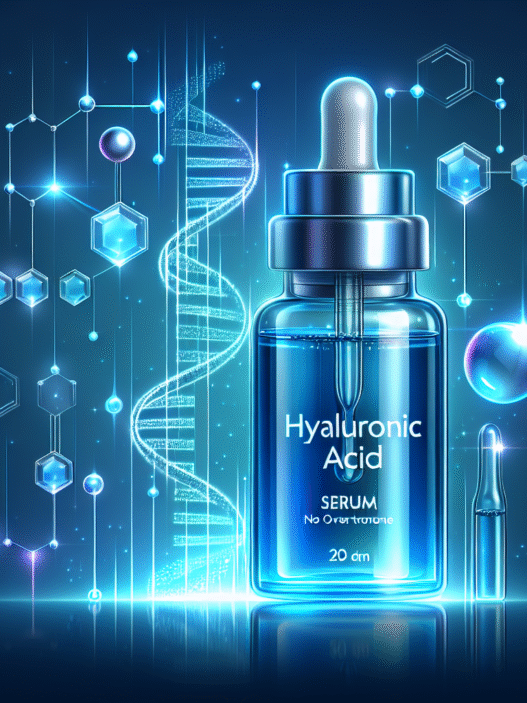Understanding Hyaluronic Acid
Introduction to Hyaluronic Acid
Hyaluronic acid is a versatile molecule that plays a significant role in maintaining health and wellness, particularly for the skin, joints, and eyes. This naturally occurring substance is found abundantly in the human body and is the focus of numerous research studies worldwide that delve into its benefits and applications (Cleveland Clinic).
Functions of Hyaluronic Acid
Hyaluronic acid serves various critical functions throughout the body. Primarily, it is found in high concentrations within the eyes, joints, and skin. Its unique structure and properties allow it to effectively transport molecules across bodily systems, acting as a scaffold that aids tissue growth, which is essential for wound healing (Cleveland Clinic).
The following table outlines some key functions of hyaluronic acid:
| Function | Description |
|---|---|
| Skin Hydration | Helps retain moisture, promoting skin elasticity and firmness. |
| Joint Lubrication | Cushions joints and reduces friction during movement. |
| Wound Healing | Aids tissue repair by facilitating healing processes. |
| Eye Health | Maintains hydration in the eyes, supporting overall vision. |
Hyaluronic acid can be produced synthetically through fermentation of certain bacteria or extracted from natural sources such as rooster combs. Its diverse applications can enhance skincare routines, joint health, and overall beauty standards. For additional insights on its benefits, visit our articles on hyaluronic acid benefits and hyaluronic acid and anti-aging.
Hyaluronic Acid for Skincare
Hyaluronic acid is celebrated for its numerous benefits in skincare, particularly for its ability to retain moisture and improve skin appearance. This section explores its topical applications and the research findings surrounding skin hydration.
Topical Applications for Skin Benefits
Topical hyaluronic acid is commonly found in a variety of skincare products, including serums, creams, and moisturizers. These formulations leverage hyaluronic acid’s inherent properties to hydrate the skin, reduce fine lines, and enhance overall complexion.
| Product Type | Common Uses |
|---|---|
| Hyaluronic Acid Serum | Provides deep hydration and promotes skin plumpness. |
| Hyaluronic Acid Cream | Locks in moisture and supports skin elasticity. |
| Hyaluronic Acid Moisturizer | Keeps skin hydrated throughout the day. |
Regular use of these products can lead to significant improvements in skin texture and moisture retention. As a result, many beauty enthusiasts incorporate hyaluronic acid into their daily routines for achieving smooth and youthful-looking skin.
Research Findings on Skin Hydration
Research underscores the efficacy of hyaluronic acid in enhancing skin hydration. A 2022 study involving 40 females aged 30 to 65 showed that applying topical hyaluronic acid twice daily led to notable improvements in skin hydration, texture, and suppleness after six weeks (Medical News Today).
In addition to topical applications, studies have also demonstrated the positive effects of orally ingested hyaluronic acid. A 2023 study of 123 females revealed that oral hyaluronic acid significantly improved skin hydration and epidermal thickness, especially after consistent daily intake for two to eight weeks (PMC).
The findings indicate that both topical and oral forms of hyaluronic acid can be beneficial for maintaining hydrated, healthy skin. As such, for enhanced skincare results, individuals may consider products that combine both topical appliqués and supplements. For more information on products containing hyaluronic acid, visit our page on hyaluronic acid benefits and explore options like hyaluronic acid injections or formulations tailored to specific needs, such as hyaluronic acid for hair.
Hyaluronic Acid for Joint Health
Hyaluronic acid is increasingly recognized not only for its skin benefits but also for its positive effects on joint health. Understanding its applications can help individuals make informed choices regarding hyaluronic acid supplements.
FDA-Approved Uses for Hyaluronic Acid
The FDA has approved hyaluronic acid injections for knee pain relief in individuals experiencing mild to moderate osteoarthritis when other treatments have failed to provide relief. According to a comprehensive 2022 review of 38 studies, these injections are generally safe and effective, though they may result in temporary local swelling and pain after treatment (Medical News Today). Patients considering this option should consult with their healthcare providers to determine if hyaluronic acid injections are suitable for their condition.
Benefits for Osteoarthritis Relief
Research indicates that hyaluronic acid can significantly benefit those suffering from knee osteoarthritis, primarily by enhancing joint lubrication and cushioning. This stabilizing effect can lead to considerable pain relief and improved quality of life (Nutrition Journal).
Here are some of the key benefits of hyaluronic acid for osteoarthritis:
| Benefits | Description |
|---|---|
| Pain Relief | Reduces joint pain levels, making movement easier and more comfortable. |
| Improved Joint Mobility | Helps in restoring smoother joint function, enhancing overall mobility. |
| Reduced Inflammation | Assists in controlling inflammation in the joints, which can exacerbate pain. |
| Enhanced Quality of Life | Increased mobility and comfort can improve daily activities and overall well-being. |
Overall, hyaluronic acid offers a multifaceted approach to managing osteoarthritis, making it a valuable option for individuals seeking relief from joint pain. Exploring other potential uses of hyaluronic acid, from topical applications to oral supplements, can further enhance an individual’s overall health strategy. For those interested in the skincare advantages of hyaluronic acid, consider looking into hyaluronic acid serum or hyaluronic acid moisturizer to complement your beauty routine.
Hyaluronic Acid Supplements
Oral Hyaluronic Acid Benefits
Oral hyaluronic acid supplements provide various benefits, particularly regarding skin hydration and overall appearance. Research indicates that daily ingestion of 120 mg of hyaluronan can significantly enhance skin conditions related to wrinkles, water content, transepidermal water loss, and elasticity among individuals aged 35-64 years (PMC).
Clinical trials have shown that high molecular weight hyaluronic acid, when taken orally, does not undergo significant degradation in the gastrointestinal tract. Instead, it is effectively absorbed by intestinal cells and disseminated throughout the body (PMC).
Benefits can be observed after just 2 to 8 weeks of supplementation, with improvements in hydration, skin tone, and epidermal thickness noted particularly at the 12-week mark. These findings highlight how hyaluronic acid supplements play a crucial role in enhancing skin health and combatting signs of aging.
| Benefit | Timeline | Observations |
|---|---|---|
| Skin Hydration | 2 – 8 weeks | Significant improvement in skin moisture levels |
| Skin Tone | 4 – 8 weeks | Noticeable enhancement in appearance |
| Epidermal Thickness | 12 weeks | Increased thickness improves overall skin structure |
Recommended Dosage and Forms
When considering the use of hyaluronic acid supplements, it is important to follow recommended dosages based on available research. Studies suggest dosages ranging from 100 mg to 200 mg per day for optimal effects on skin hydration and elasticity (PMC).
Hyaluronic acid supplements typically come in several forms, including:
- Capsules or Tablets: Easy to swallow and convenient for daily use.
- Powder: Can be mixed with water or beverages, allowing for flexibility in consumption.
- Liquid: Ready-to-drink versions may offer faster absorption rates.
Consumers should choose the form that best fits their lifestyle. Due to its various advantages, oral hyaluronic acid supplementation can complement topical applications such as hyaluronic acid serums and moisturizers, enhancing overall skincare routines.
For those exploring anti-aging options, it is essential to consult a healthcare provider before starting any supplement regimen. Hydration and skin health benefit greatly from a comprehensive approach that includes both internal support and external treatments.
Safety and Side Effects of Hyaluronic Acid
Hyaluronic acid is renowned for its many benefits in beauty and health, particularly in anti-aging and hydration. However, it is essential for consumers to be aware of potential side effects and safety considerations regarding its use.
Potential Side Effects
Generally, hyaluronic acid is considered safe, and adverse reactions are rare. However, some individuals may experience mild side effects, particularly with injectable forms. Common reactions can include:
| Side Effect | Description |
|---|---|
| Localized swelling | Mild swelling at the injection site lasting a few days |
| Pain | Discomfort or pain following injection |
| Allergic reactions | Rare cases of allergic responses can occur |
Severe side effects, such as infections or tissue necrosis, are rare but necessitate immediate medical attention (Medical News Today). For topical applications, side effects are rare, and hyaluronic acid is also deemed safe to use during pregnancy or nursing (Cleveland Clinic).
Safety Considerations for Use
Before starting any new supplement regimen, including hyaluronic acid supplements, certain safety precautions should be taken into consideration:
-
Consult a Healthcare Professional: Individuals should consult their doctor before using hyaluronic acid, especially if they have pre-existing health conditions or are taking other medications.
-
Product Quality: Ensure the chosen hyaluronic acid product is from a reputable source. This helps mitigate the risk of impurities and ensures the product meets safety standards.
-
Follow Recommended Dosage: Adhering to the suggested dosage is crucial to avoid complications associated with excessive intake. There is no universal dosage, so it’s best to follow guidelines provided by the manufacturer or a healthcare professional.
-
Monitor for Adverse Reactions: Users should monitor their body’s response after starting hyaluronic acid. If adverse reactions—such as swelling or redness—occur, usage should be halted, and a healthcare professional should be contacted.
-
Dermal Health: For those considering hyaluronic acid injections or topical applications, consulting a qualified dermatologist can help tailor treatments to individual skin types and concerns.
By observing these safety considerations and understanding potential side effects, individuals can safely incorporate hyaluronic acid into their beauty and health routines, enhancing their overall wellness experience. For a deeper understanding of the diverse benefits of hyaluronic acid, readers can explore our sections on hyaluronic acid benefits and hyaluronic acid and skincare.
Hyaluronic Acid in Wound Healing
Role of Hyaluronic Acid in Wound Care
Hyaluronic acid plays an essential role in wound healing by helping to control inflammation and facilitate the healing process. It is widely recognized for its ability to assist in the recovery of various types of wounds, ranging from minor cuts and burns to more severe injuries such as postsurgical scars. Research has indicated that topical applications of hyaluronic acid can regulate inflammation, which is a crucial factor in wound management.
By promoting hydration and tissue repair, hyaluronic acid enhances skin regeneration, which is vital for effective wound healing. Its properties make it an ideal ingredient in many wound care products, enhancing skin flexibility and elasticity. For information on supplementation and other applications, see our article on hyaluronic acid benefits.
| Wound Type | Potential Benefits of Hyaluronic Acid |
|---|---|
| Minor Burns | Aids in moisture retention and inflammation control |
| Surgical Scars | Promotes tissue repair and healing |
| Chronic Wounds | Enhances skin regeneration and cellular repair |
Research on Wound Healing Properties
Numerous studies have demonstrated the effectiveness of hyaluronic acid in promoting wound healing. Evidence suggests that its derivatives have healing effects on various types of wounds, including burns and epithelial surgical wounds (Wound Repair and Regeneration). A review published in 2022 highlighted its potential benefits for managing inflammation and facilitating the healing process in clinical applications (Medical News Today).
The ability of hyaluronic acid to retain moisture and improve skin hydration makes it a valuable component in treatments aimed at enhancing wound repair. With ongoing research, the versatility of hyaluronic acid continues to expand, enhancing its reputation not only for skincare but also as a critical player in wound management.
For more on its skin applications, visit our section about hyaluronic acid for skin or explore its versatility in hyaluronic acid creams and moisturizers that further assist in skin hydration and care.





















